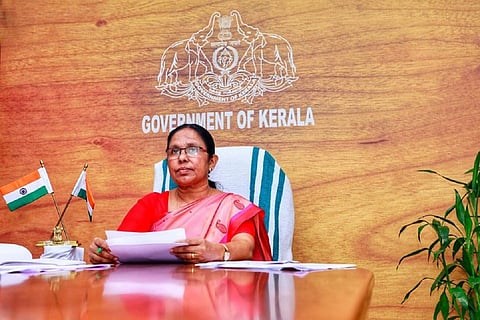

KK Shailaja Teacher's leadership abilities received international recognition after Kerala’s efficient handling of the pandemic made headlines worldwide.
Kerala’s Health Minister KK Shailaja was among the world leaders invited to speak on the occasion of the United Nations Public Service Day on June 23.
The Minister’s leadership capabilities received global recognition after Kerala's efficient handling of the coronavirus pandemic made headlines worldwide. She joined a panel of 10 other speakers to address a virtual conference on the occasion of the UN Public Service Day.
The United Nations observed Public Service Day this year on Tuesday, to honour those working on the frontlines during the COVID-19 pandemic. These include health care workers and people delivering essential services in areas of sanitation, social welfare, education, postal delivery, transport, law enforcement and more, according to the World Health Organisation.
These “public servants globally have continued to work in the community as many people shelter at home, risking their lives to ensure ours can continue. The United Nations will mark Public Service Day on 23 June to honour the women and men who are risking their lives and health to deliver essential public services amid the ongoing COVID-19 pandemic,” WHO’s website said.
The UN brought together world leaders in a virtual conference to speak on the importance of the continuation of public service provisions during the pandemic. The conference looked at the approaches different countries adopted to mitigate the crisis.
Four-pronged approach
Speaking on behalf of Kerala, Minister Shailaja explained that the Left government in the state took a four-pronged approach to tackle the crisis at an early stage.
The first stage dealt with aggressive testing of potential cases and their contacts, strict quarantining, focused and strategic testing, strict hospital isolation and best available treatment, said the Minister.
“The second stage focused on reducing the amount of virus circulating in the society,” explained the Minister, adding that the government initiated a mass campaign called ‘Break The Chain’ to achieve this. The campaign focused on SMS — soap or hand washing, mask and social distancing practices, she said.
The third stage focused on preventing the virus from reaching the vulnerable population i.e. the elderly, people with comorbidities, pregnant women and children aged below 10. For this, the state effectively initiated reverse quarantine — where vulnerable sections would isolate themselves to prevent contracting the infection.
Lastly, the state activated its ‘decentralised social security systems’ to ensure that containment measures, such as lockdown, does not affect the marginalised and vulnerable populations of the state disproportionately.
Further, the Health Minister said that the state began preparing for the pandemic early on. “The very next day of the WHO’s statement of caution on a respiratory virus of pandemic potential, we activated our entire surveillance network,” she added.
The government’s objective was to limit the targeted case fatality rate (proportion of people who die from the infection) to below two years of age and the basic reproduction number of R0 (expected number of cases directly generated by one case) to below 1, she explained.
“This is to ensure that we did not have a local epidemic so that we can use our health system capacity primarily to deal with imported cases,” she said.
The Health Minister concluded by stating that the government’s four-pronged strategy proved to be effective.
“Even after 142 days of the pandemic, over 6.5 lakh people kept under surveillance and tracing and isolating thousands of imported cases. Kerala’s local spread is still below 12.5 percent, R0 below 0.25 percent, case fatality rate below 0.6 percent and test positive rate (percentage of people tested turning positive for the virus) below two percent,” she added.
Other speakers
Other than the Health Minister, the conference also included:
a) António Guterres, Secretary-General of the United Nations (video statement),
b) Mr. Tijjani Muhammad-Bande, President of the General Assembly,
c) H.E. Ms. Sahle-Work Zewde, President of Ethiopia,
d) Dr. Tedros Adhanom Ghebreyesus, Director General, World Health Organization,
e) Mr. Liu Zhenmin, United Nations Under Secretary-General for Economic and Social Affairs,
f) H.E. Mr. Chin Young, Minister of Interior and Safety, Republic of Korea,
g) Dr. In-Jae Lee, Deputy Minister of the Interior and Safety, Republic of Korea,
h) Mr. Jim Campbell, Director, Health Workforce Department World Health Organization,
i) Ms. Annette Kennedy, President of International Council of Nurses
j) Rosa Pavenelli, General Secretary, Public Services International.
The speakers were moderated by Odette Ramsingh, Executive Director, Human Resources, Sefako Makgatho Health Sciences University
The conference had an orchestral piece performed by the UN Orchestra and a video of public servants in action developed from over 80 submissions received from public servants at the national and local level worldwide.